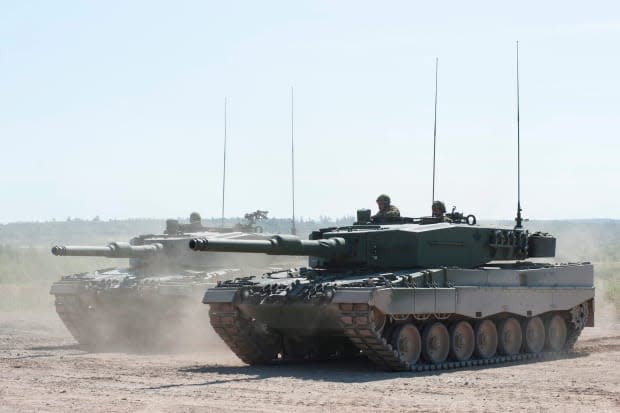U.K. foreign minister says allied response to Ukraine invasion sends message to world's tyrants

U.K. Foreign Secretary James Cleverly says the international community's unified opposition to Russia's war on Ukraine is sending a powerful message to tyrants around the world that NATO doesn't cut and run in the face of threats.
"We need to make sure that the message that we send to anybody who is watching is that we defend the concept of territorial integrity, that we defend the rule of law, that we defend the UN Charter," James Cleverly told CBC News Network's Power & Politics Thursday.
"Anybody witnessing our response to Russia's attempted invasion of Ukraine understands how strongly the international community, the U.K. and Canada, and our friends and allies, how strongly we take these issues," he told host Katie Simpson.
Cleverly, who serves as the U.K.'s secretary of state for foreign, Commonwealth and development affairs, is in Toronto this week as part of a visit to the United States and Canada.
He told CBC News the international community can't afford to waver in its support for Ukraine as it fights to drive out Russian forces.
Cleverly told Simpson he issued that warning to officials in the U.S. earlier this week during a conversation with U.S. Secretary of State Antony Blinken.
"The point that I made when I was in America was that we have made a commitment to support the Ukrainians until they are successful in defending their homeland against this Russian attempted invasion," he said.
"And if we fail to do so, then the signal that we would send to every potential aggressor anywhere in the world is that we don't have the patience, we don't have the strategic endurance to stick with this until the job is done.
"And I think that would make the world a much more dangerous place and far more costly in human lives, as well as in money."
China is watching
Taiwan's Foreign Minister Joseph Wu told CBC News Network's Rosemary Barton Live on Sunday that he believes China is one of those autocratic regimes studying the Russian invasion of Ukraine. He said he fears Beijing is using lessons learned from Russia's struggles in Ukraine to shore up its own plans for Taiwan.
"I think what the Chinese are learning from [the war in Ukraine] is the weakness of the Russian military so that they can strengthen themselves in their future possible attack against Taiwan," Wu told Barton.
"Of course, this is going to be a wrong lesson, because war means devastation."
Last week, during a press conference following his meeting with Prime Minister Justin Trudeau, Japanese Prime Minister Fumio Kishida said Japan and Canada "strongly agree" that there should be no attempt to change the international "status quo" through violence — although he didn't specifically mention Taiwan.
"That should never happen anywhere, including in Asia," he said.

Cleverly said Russia's invasion has strengthened NATO.
"Vladimir Putin was hoping to fracture NATO as a defensive alliance, and instead what we've seen is NATO coming together and two new countries applying to join NATO as a direct response to Russia's attempted invasion of Ukraine," he said.
Sen. Peter Boehm, chair of the Senate foreign affairs committee and a former senior diplomat, said the strength of the allied response to the invasion proved that Russian President Vladimir Putin's assumptions about the war — that it would be swift, that Russia's natural gas supply could be weaponized, that the alliance would lack staying power — were false.
"What has happened is that unprecedented amount of G7 coordination then spilled into NATO," he said. "NATO is a defensive alliance and it's not war-by-proxy. It's a war that Russia started, that they thought they could quickly win. And they failed."
A call for tanks
Canada has provided more than $1 billion in military assistance to Ukraine since the invasion began. Ottawa announced $500 million for a missile defence system and 200 armoured vehicles in recent weeks.
Ukraine has said it needs several hundred NATO-standard heavy tanks to counter invading Russian forces. Trudeau has not yet offered to send tanks.
Canada has 82 German-made Leopard 2 tanks — but it's among several countries that can't export them to Ukraine unless Germany signs off on the donation.

Trudeau has not ruled out sending Leopard 2 tanks to Ukraine if Germany drops its objections to the donation of military vehicles it sold to Canada.
That issue will be on the table at Friday's meeting of the Ukraine Defense Contact Group at Ramstein Air Base in Germany. There, representatives of the countries providing military support to Ukraine will hear directly from Ukrainian officials about what the country needs to continue its fight.
"There is a lot more to military support to Ukraine than just tanks," Cleverly said. He added that Canada has worked well with allies to coordinate military support, ensuring that there are no gaps in critical supplies.
That coordination is critical, he said, because Ukraine's materiel requirements have shifted since the war began. At the start, he said, Ukraine called for donations of Javelin anti-tank missiles and training, but its needs changed as the nature of the conflict changed.
"Then air defence systems became the thing that the Ukrainians needed the most," he said. "Then the ability to repair their energy and water infrastructure became the priority.
"And increasingly now we're looking at heavy battlefield armour, both tanks and artillery. So ... their requirement evolves … and that evolution is done in close coordination with our friends and allies across NATO."


